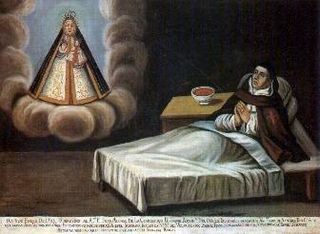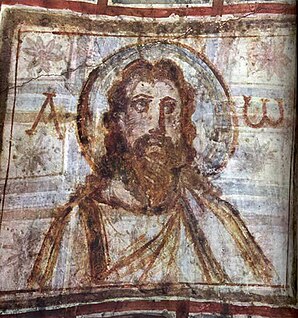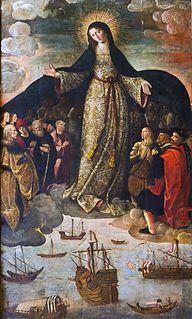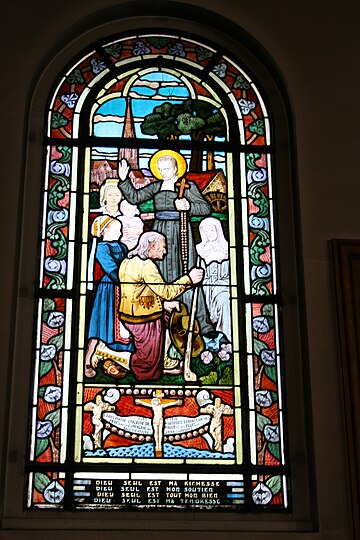
The Holy Rosary, also known as the Dominican Rosary, refers to a form of prayer psalter used in the Catholic Church and to the string of knots or beads used to count the component prayers. When used for the prayer, the word is usually capitalized, as is customary for other names of prayers, such as "the Lord's Prayer", and "the Hail Mary"; when referring to the beads, it is written with a lower-case initial letter.

Catholic spirituality includes the various ways in which Catholics live out their Baptismal promise through prayer and action. The primary prayer of all Catholics is the Eucharistic liturgy in which they celebrate and share their faith together, in accord with Jesus' instruction: "Do this in memory of me." The Catholic bishops at the Second Vatican Council decreed that "devotions should be so drawn up that they harmonize with the liturgical seasons, accord with the sacred liturgy, are in some fashion derived from it, and lead the people to it, since, in fact, the liturgy by its very nature far surpasses any of them." In accord with this, many additional forms of prayer have developed over the centuries as means of animating one's personal Christian life, at times in gatherings with others. Each of the religious orders and congregations of the Catholic church, as well as lay groupings, has specifics to its own spirituality – its way of approaching God in prayer to foster its way of living out the Gospel.

Totus tuus was routinely used to sign off letters written in Latin, meaning "all yours", often abbreviated as "t.t.". In recent history Totus tuus was used by Saint John Paul II as his personal motto to express his personal Consecration to Mary based on the spiritual approach of Saint Louis de Montfort and the Mariology in his works. The pontiff explained the meaning further in his book Crossing the Threshold of Hope where he defines it as not only an expression of piety but also of devotion that is deeply rooted in the Mystery of the Blessed Trinity.

The Secret of the Rosary is a book about the Holy Rosary written by Saint Louis de Montfort, a French priest and Catholic saint who died in 1716. The English translation of the book bears the Imprimatur of Archbishop Thomas E. Molloy of the Roman Catholic Diocese of Brooklyn.

The Missionaries of the Company of Mary is a missionary religious congregation within the Catholic Church. The community was founded by Saint Louis de Montfort in 1705 with the recruitment of his first missionary disciple, Mathurin Rangeard. The congregation is made up of priests and brothers who serve both in the native lands and in other countries. The Montfortian Family comprises three groups: the Company of Mary, the Daughters of Wisdom and the Brothers of Saint Gabriel.
The Basilica of St. Louis de Montfort is a Roman Catholic basilica at Saint-Laurent-sur-Sèvre in the Vendée department, in the Pays de la Loire region in France.

Secret of Mary is a book by Saint Louis de Montfort on the Roman Catholic theme of devotion to the Blessed Virgin Mary.

Rosarium Virginis Mariae is an Apostolic Letter by Pope John Paul II, issued on October 16, 2002, which declared October 2002 to October 2003 the "Year of the Rosary". It was published by Pope John Paul II in 2002 at the beginning of the twenty-fifth year of his pontificate.

Five methods of praying the rosary are presented within the works of Saint Louis de Montfort, a French Roman Catholic priest and writer of the early 18th century. Montfort was an early proponent of Mariology, and much of his work is devoted to the subjects of the Blessed Virgin Mary and the rosary. While the rosary contains a fixed set of prayers recited with the use of beads, Montfort proposed a number of methods to pray the rosary with more thorough devotion. Two of the methods are described in his book The Secret of the Rosary, in the fiftieth rose (chapter):
"In order to facilitate the exercise of the holy Rosary, here are several methods to recite it holily, with the meditation of the joyful, sorrowful and glorious mysteries of Jesus and Mary. You stop at that which is most to your liking: you can form yourself another particular method, as several saintly persons have done."

Redemptoris Mater is the title of a Mariological encyclical by Pope John Paul II, "On the Blessed Virgin Mary in the life of the Pilgrim Church", delivered on March 25, 1987 in Saint Peter's Basilica in Rome.

The history of Catholic Mariology traces theological developments and views regarding Mary from the early Church to the 21st century. Mariology is a mainly Catholic ecclesiological study within theology, which centers on the relation of Mary and the Church. Catholic Mariology is the encyclopedic area of theology concerned with Mary, the Mother of God. Theologically, it not only deals with her life, but her veneration in daily life, prayer, art, music, architecture, in modern and ancient Christianity throughout the ages.

Throughout history Roman Catholic Mariology has been influenced by a number of saints who have attested to the central role of Mary in God's plan of salvation. The analysis of Early Church Fathers continues to be reflected in modern encyclicals. Irenaeus vigorously defended the title of "Theotokos" or Mother of God. The views of Anthony of Padua, Robert Bellarmine and others supported the doctrine of the Immaculate Conception of the Virgin Mary, which was declared a dogma in 1850.

A number of prayers to Jesus Christ exist within the Roman Catholic tradition. These prayers have diverse origins and forms. Some were attributed to visions of saints, others were handed down by tradition.

Saint Louis de Montfort's Prayer to Jesus is a reflection of his philosophy of "total consecration to Jesus Christ through Mary" a theme that centuries later influenced the development of Roman Catholic Mariology.

The exact origins of both the rosary and scapular are subject to debate among scholars. Pious tradition maintains that both the rosary and the brown Scapular of Our Lady of Mount Carmel were given by the Virgin Mary to saints Dominic and Simon Stock respectively during the 13th century. Historical records document their growth during the 16th and 17th centuries in Europe. By the early 20th century, they had gained such a strong following among Catholics worldwide that Josef Hilgers, writing in the Catholic Encyclopedia of 1914 stated: "Like the Rosary, the Brown scapular has become the badge of the devout Catholic."
Devotion to the Rosary is one of the most notable features of popular Catholic spirituality. According to Pope John Paul II, rosary devotions can foster some central objectives of Christian spirituality and they are "among the finest and most praiseworthy traditions of Christian contemplation." From its origins in the twelfth century the rosary has been seen as a meditation on the life of Christ, and it is as such that many Popes have approved of and encouraged recitation of the rosary.
Preparation for Total Consecration according to Saint Louis Marie de Montfort was inspired by Louis de Montfort and published in 2001. Saint Louis dedicated his life to following and praying to the Virgin Mary. His devotion to Mary was even considered “the best and most acceptable form of devotion to Our Lady” by Pope Pius IX. Four of his performed miracles were examined by the Sacred Congregation. Saint Louis de Montfort was canonized by Pope Pius XII on July 20, 1947, over two hundred years after his death. The process took a very long time due to his lack of followers and the unfortunate era in which he died. His two biographies, one by Grandet and the other Father de Clorivière, both dated in the 1700s, which was a time of “immense social and religious upheaval.”

For centuries, Marian devotions among Roman Catholics have included many examples of personal or collective acts of consecration and entrustment to the Virgin Mary, with the Latin terms oblatio, servitus, commendatio and dedicatio having been used in this context. Consecration is an act by which a person is dedicated to a sacred service, or an act which separates an object, location or region from a common and profane mode to one for sacred use. The Congregation for Divine Worship and the Discipline of the Sacraments clarifies that in this context, "It should be recalled, however, that the term "consecration" is used here in a broad and non-technical sense: the expression is use of 'consecrating children to Our Lady', by which is intended placing children under her protection and asking her maternal blessing for them".

Louis-Marie Grignion de Montfort was a French Roman Catholic priest and Confessor. He was known in his time as a preacher and was made a missionary apostolic by Pope Clement XI.
Henri-Marie Boudon was a 17th-century Roman Catholic French abbot and spiritual author.












